Copper And Zinc Imbalance
Copper and zinc are essential nutrients necessary to sustain the health and function of the human body. These two metal compounds naturally exist in the environment around us, including our food and water, but can pose major health complications if they are concentrated in our bodies inadequately.
Up until 1963, clinicians did not even question the possibility that zinc deficiency may cause serious health symptoms and nevertheless pose a fatal threat (5). Since then, an increasing rate of chronic illness and disease has caused researchers to further investigate how both metal toxicity and deficiency affect our health and wellbeing.
Symptoms of a copper and zinc imbalance are plentiful and can lead to total body dysfunction if left untreated. Learn if your symptoms are signs that a low copper and high zinc nutrition plan can improve your quality of life. You can test your copper to zinc ratio through our Comprehensive Blood Analysis.
Function of Zinc
Only within the past 50 years have scientists begun to unravel and learn that zinc serves the role of numerous biological interactions needed to sustain life. Once thought to have only affected the function of 3 enzymes required for metabolism, researchers have learned that zinc is one of the most important trace elements associated with the proper function of more than 300 enzymes and over 1,000 different types of proteins necessary for reading DNA. (5)
Some of the biochemical responsibilities associated with zinc include: (1)
- Enzyme function
- Nucleic acid metabolism is required for the necessary coding of DNA and a series of physiological processes
- Cell signaling is most importantly designed to defend the body from both real and perceived threats
- Apoptosis, referred to as programmed cellular death
Yet what do these responsibilities look like from a physiological perspective? Zinc is required for the following tasks: (1)
- Growth and development
- Lipid metabolism, which in most simplistic terms, can be thought of as necessary fat storage for energy and support in cells
- Brain function
- Immune system regulation
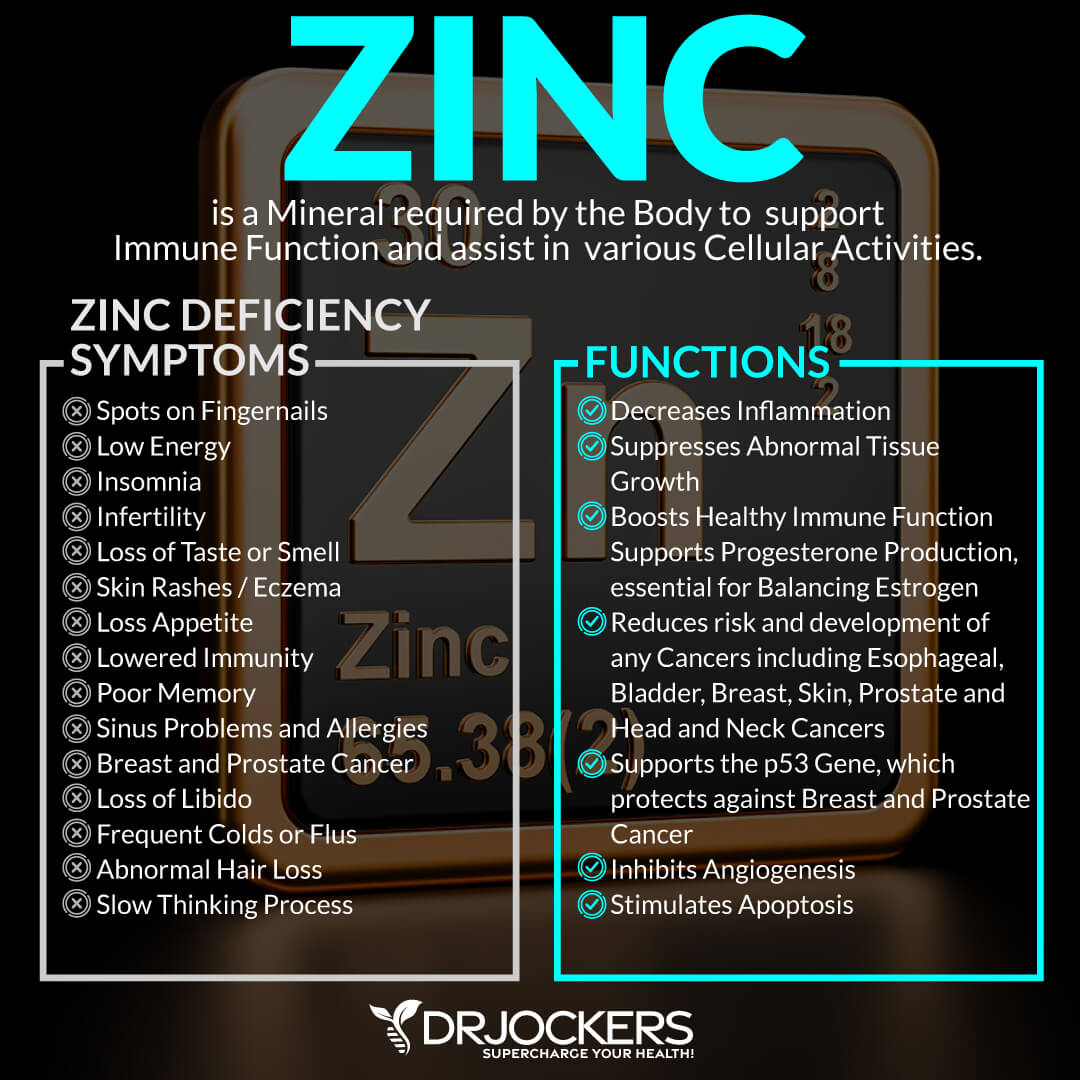
Function of Copper
Copper is a trace mineral also necessary for the healthy functioning of the human body. Copper is responsible for enzyme function, and the metabolism of carbohydrates and is primarily found in the liver, brain tissue, kidneys, and hair (2, 5, 7). Although researchers continue to learn about the effects of variable levels of copper in the body, the increase in metabolic complications and cognitive illnesses has scientists focusing attention on the effects of the metal on the brain.
You may know it best as the stress hormone, but norepinephrine is a vital hormone and neurotransmitter that enables our bodies to react and respond in threatening circumstances. Norepinephrine has also been implicated as a necessary anti-inflammatory agent in stimulating brain cells found to be lacking in patients with Alzheimer’s disease (9). In order to create norepinephrine, copper is required (2).
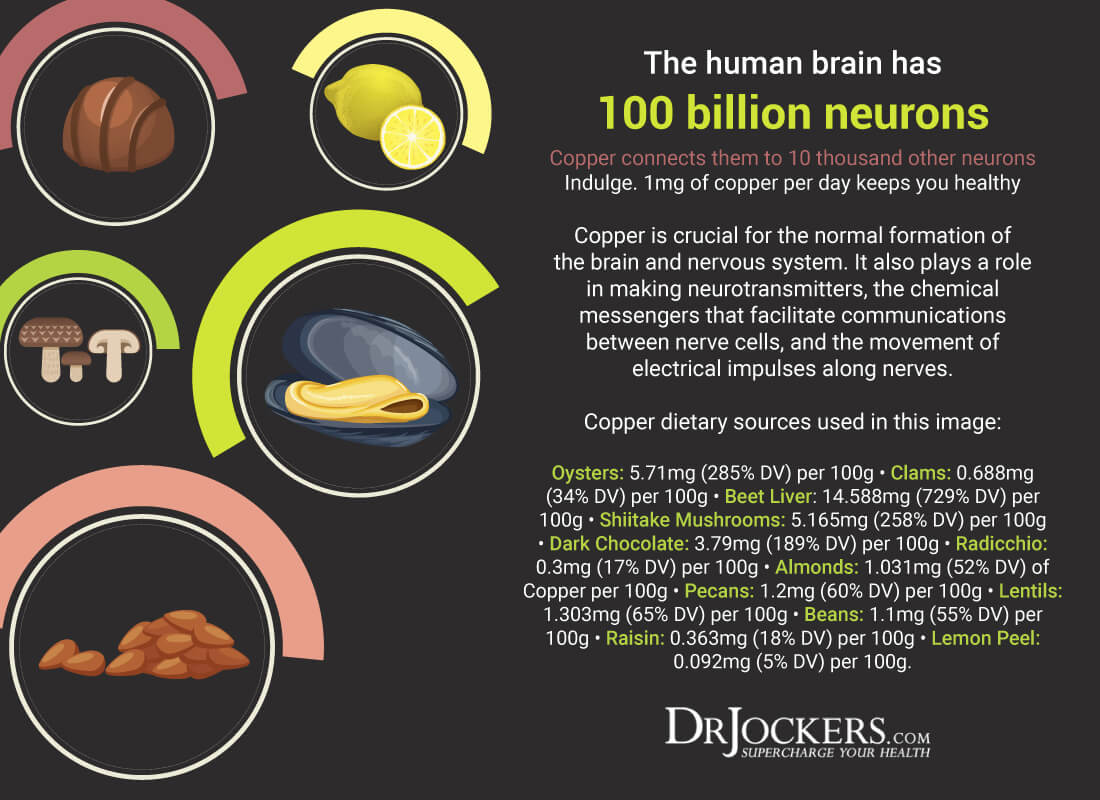
Relationship Between Zinc and Copper
Zinc and copper compete against one another as antagonists to properly regulate the physiological pathways in your body. The proper balance between the two trace minerals is critical to maintaining health.
Unlike zinc, copper can readily accumulate in the body in toxic concentrations. To maintain adequate zinc levels, a higher dose of zinc compared to copper is required daily. Zinc is only stored for short durations in the blood and bone and is quickly excreted through our urine and fecal matter. (7)
Ideally, nutritional biochemist Dr. Paul Eck recommends that the proper intake of copper to zinc should be a 1:8 ratio (8). When properly concentrated in the right balance, zinc behaves like the bigger brother blocking copper in food and the body from being absorbed (5).
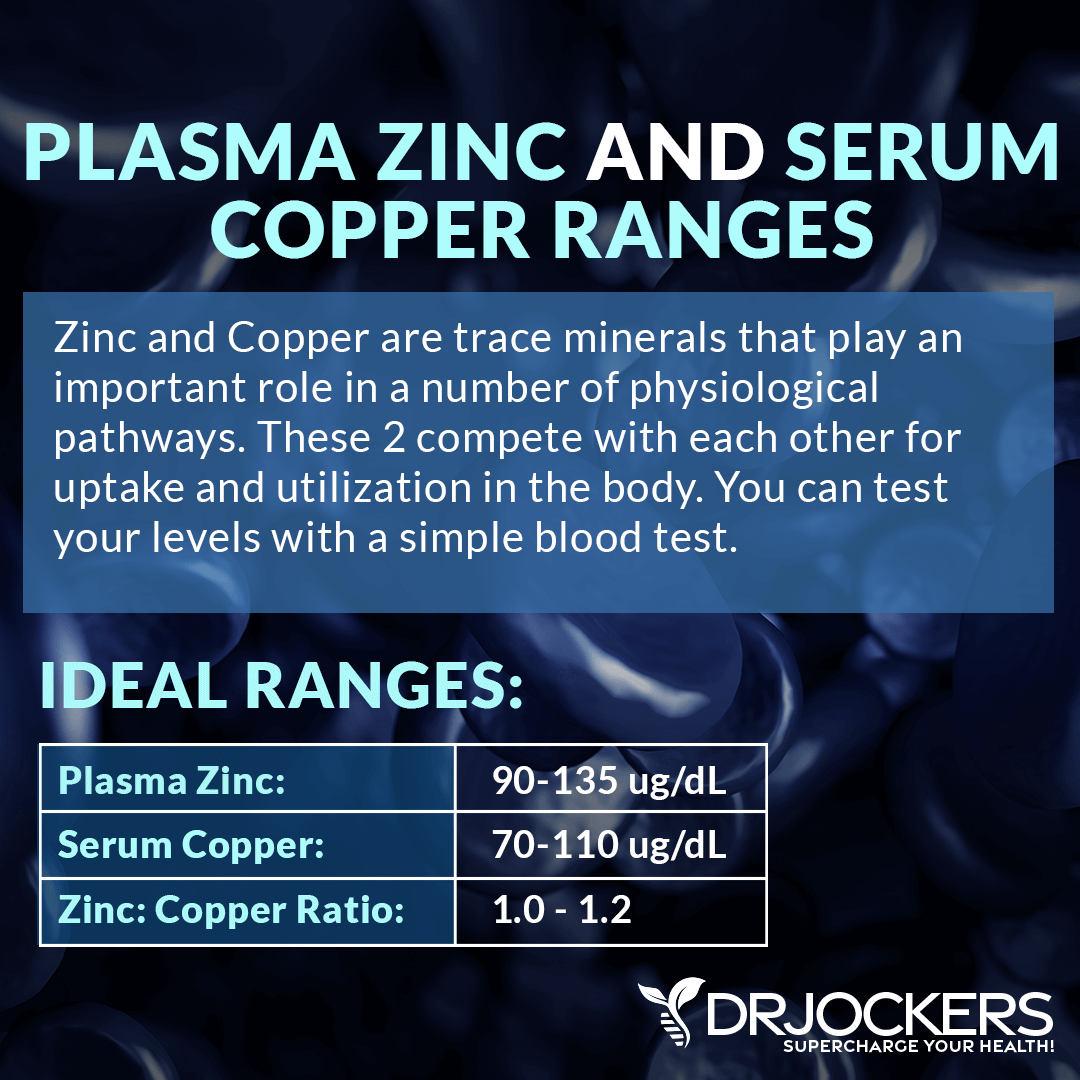
Signs of a Copper and Zinc Imbalance
A variety of health concerns may be signs that you have a copper and zinc imbalance. Currently based on the average American’s diet, it is most likely that people are experiencing symptoms resulting from elevated copper levels and a deficiency in zinc. Do you have any of the following symptoms? (5, 8)
- Night blindness
- Age-related macular degeneration
- Emotional disturbances
- Frequent panic attacks and headaches
- A slow recovery rate from healing ulcers, wounds, and even stretch marks
- A high rate of chronic infections and sickness
- Mental lethargy or chronic fatigue
- Gastrointestinal problems such as diarrhea
- Reduced appetite and weight loss
- Skin problems such as blisters and roughness
These symptoms may be an indication that your homeostatic balance is not properly functioning. Without attention, an imbalance of copper and zinc can lead to mental, physical, physiological, and emotional illness and disease.
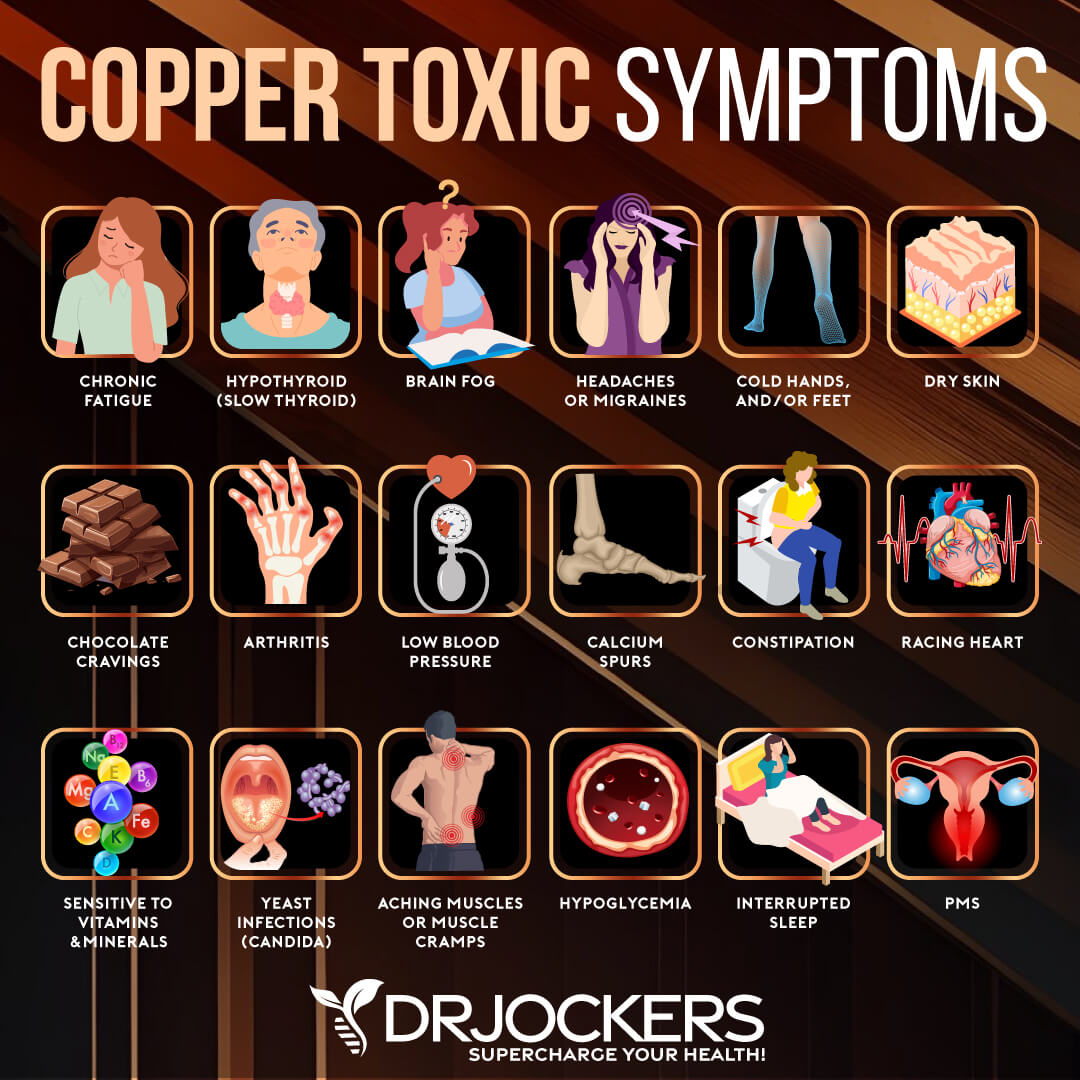
Anxiety and Pyroluria
One of the most common psychiatric disorders in the United States is anxiety affecting an estimated 30% of Americans. Chronic anxiety is known to cause greater health concerns such as increased blood pressure, depression, and lowered immunity. Zinc therapy has been shown to treat symptoms of anxiety. (1)
Pyroluria is a unique metabolic condition characterized by extremely low zinc status. It is considered by many in the functional medicine world as the most common unknown disorder. Pyrolurics need a specific diet, lifestyle, and supplementation program to get well.
The symptoms of pyroluria include chronic anxiety, poor stress tolerance, digestive issues, poor immunity, joint pain, acne or eczema, mood swings, and poor short-term memory. These individuals often have difficulty digesting and absorbing protein and they are easily wrecked by increasing stress.
Copper and Zinc Imbalance and Depression
Just like a domino effect, there is a theme in the maintenance of health and the destruction of it. Associated with anxiety, 35 million Americans alone are believed to suffer depression within their lifetime (3). Researchers who analyzed levels of zinc and copper in depressed and anxious individuals found an interesting correlation between the two minerals.
Individuals diagnosed with depression alone but with no symptoms of anxiety had decreased levels of zinc. Those patients experiencing both depression and anxiety were not only deficient in zinc but they also had high concentrations of copper in their bodies.
Remember, copper stimulates the synthesis of the excitatory hormone, norepinephrine. If the flood of copper overwhelms zinc concentrations, anxiety may develop when checks and balances go unattended. (3)
Zinc Deficiency Lowers Immunity
Both depressed and anxious people are at a great risk of developing chronic immune infections and illnesses associated with inflammation such as cardiovascular disease (3). These health struggles are activated by oxidative stress.
Zinc shows antioxidant properties by preventing liver damage in alcoholics and regulating GABA and glutamate. Both GABA and glutamate are essential to the central nervous system. Coupled together they provide appropriate nerve impulses and control the ability of cells to reproduce. Low levels of zinc reduce GABA and glutamate, thereby triggering health consequences reliant on healthy liver function and cellular immunity. (1)
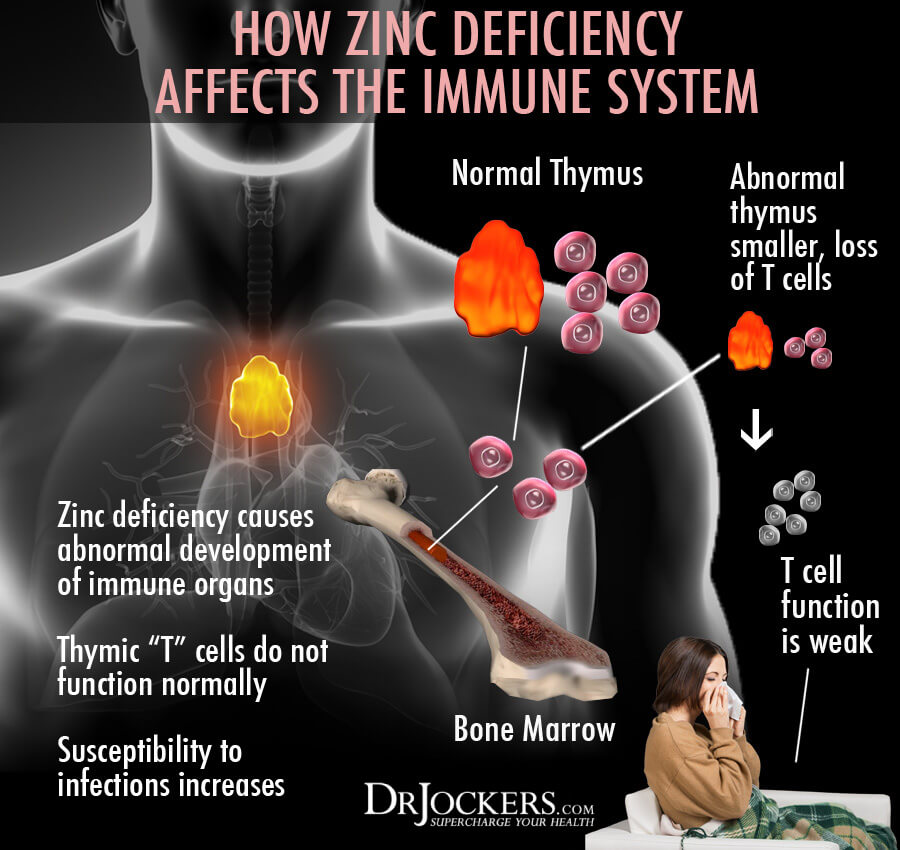
Copper and Zinc Imbalance in Autism
Researchers continue to dig deeper into the neurodevelopmental complications affecting individuals with autism. Zinc therapy can improve zinc concentrations and aid in the detoxification of copper from tissue. Already found to have success in treating symptoms of anxiety and immune dysfunction, is it also possible that autistic individuals can benefit from a healthy balance of copper and zinc?
Clinical studies have found that an increase in copper and a decrease in zinc are directly correlated to the severity of symptoms associated with autism. A reduction in GABA and glutamate as noted in individuals with abnormal immune responses is believed to aggravate symptoms of autism and cause changes across the central nervous system.
The concentrations of the amino acid, GABA, and neurotransmitter, glutamate, are disrupted by a deficiency in zinc and high levels of copper. Furthermore, an increase in copper known to cause excitability may be to blame for the hyperactivity symptoms of individuals with autism and ADHD (attention deficit hyperactivity disorder). (2)
Digestive issues are commonly a symptom of autism. Supplementing zinc in the diet has been shown to correct issues of malabsorption and improve the severity of symptoms (4).
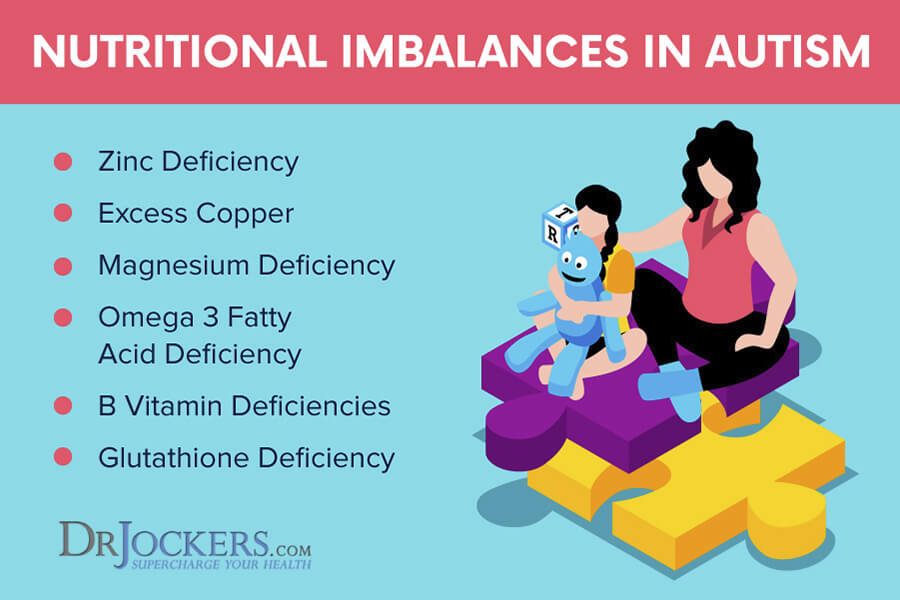
Zinc Deficiency Can Cause Birth Defects
Low zinc concentrations in a developing fetus have been found to increase the risk of low birth weight (7). Pregnant women have a high daily zinc recommendation because of their feeding requirements for a developing fetus.
As mentioned, zinc is a critical nutrient required for growth and development, which in animal studies was found to cause fatality in newborns when zinc remained absent from the diet (5).
Zinc Deficiency Causes Metabolic Problems
Acrodermatitis enteropathica (AE): AE is a metabolic disorder that is characterized by zinc deficiency. This disorder is typically diagnosed shortly after birth and these individuals are more likely to experience congenital malformations, emotional disturbances, problems gaining weight, lactose intolerance, and further malabsorption problems. Left untreated without zinc supplementation, AE can lead to fatality. (5)
Hyperammonemia: A metabolic problem resulting in the excess buildup of ammonia in the blood as a possible consequence of liver disease affected by zinc deficiency (5).
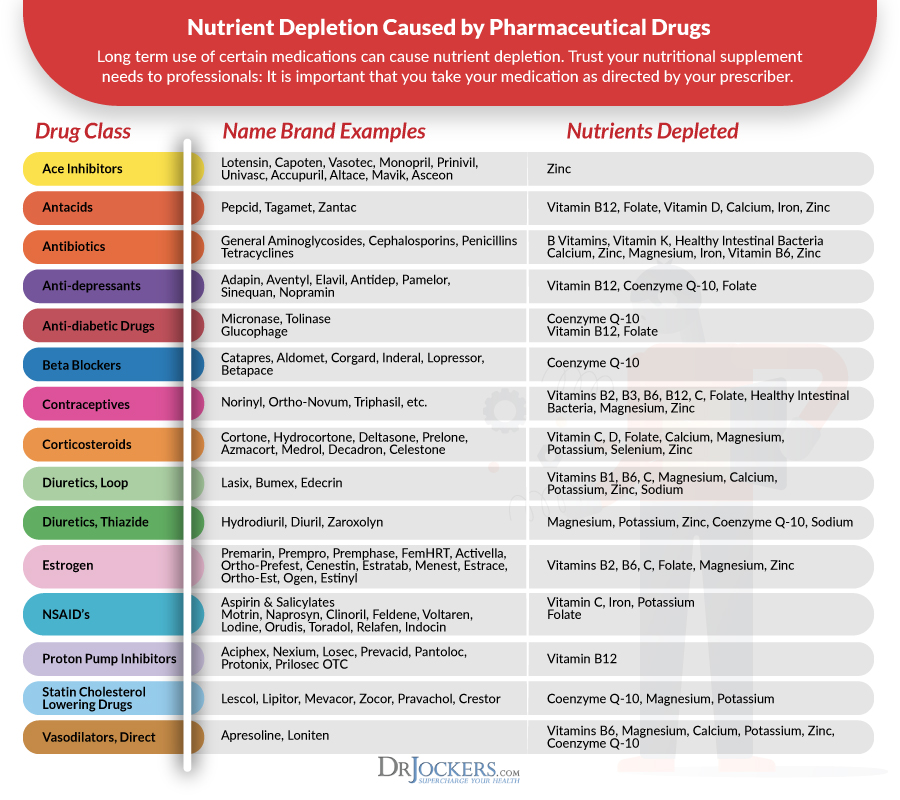
Zinc Therapy For Major Health Problems
Studies have shown that the treatment of zinc therapy to individuals faced with a variety of health struggles is effective. Zinc treatment has successfully improved the health of people with the following problems: (5, 6)
- Dwarfism
- Hypogonadism
- Hypogammaglobulinemia
- Giardiasis
- Strongyloidosis
- Schistosomiasis
- Sexual Ability
- Wilson’s Disease
- Diarrhea
- Macular degeneration
- Common cold symptoms
- Sickle-cell disease

Balancing your Copper and Zinc Levels
The National Institutes of Health (NIH) has developed dietary recommendations for both copper and zinc intake. They recommend anywhere from 2 mg to 13 mg of zinc per day depending on the individual (6). Most in the functional nutrition and functional medicine world believe this should be much higher, in the 30-40 mg range per day for most individuals.
However, it is likely that this recommendation should be higher given the decreased abilities of our gastrointestinal tract to absorb zinc adequately. In fact, most in the functional nutrition and functional medicine world believe this should be in the 30-40mg per day range for most individuals. I personally recommend 10mg per 50 lbs of body weight as a great starter dosage.
The recommended dietary allowance for copper is not to exceed 4 mg daily (8). I recommend 1mg per 50 lbs of body weight. This comes out to a 10:1 zinc ratio which is higher than Dr Eck’s recommendation, but I have found that copper is ubiquitous due to copper water pipes.
Additionally, in the modern American diet, copper is very high and zinc is low. Those with compromised digestive function will also have more trouble absorbing the zinc, so more is needed. If you are over-consuming zinc, the most common first symptom is nausea. When a client complains of that while supplementing with high doses of zinc, I begin reducing the dosage.
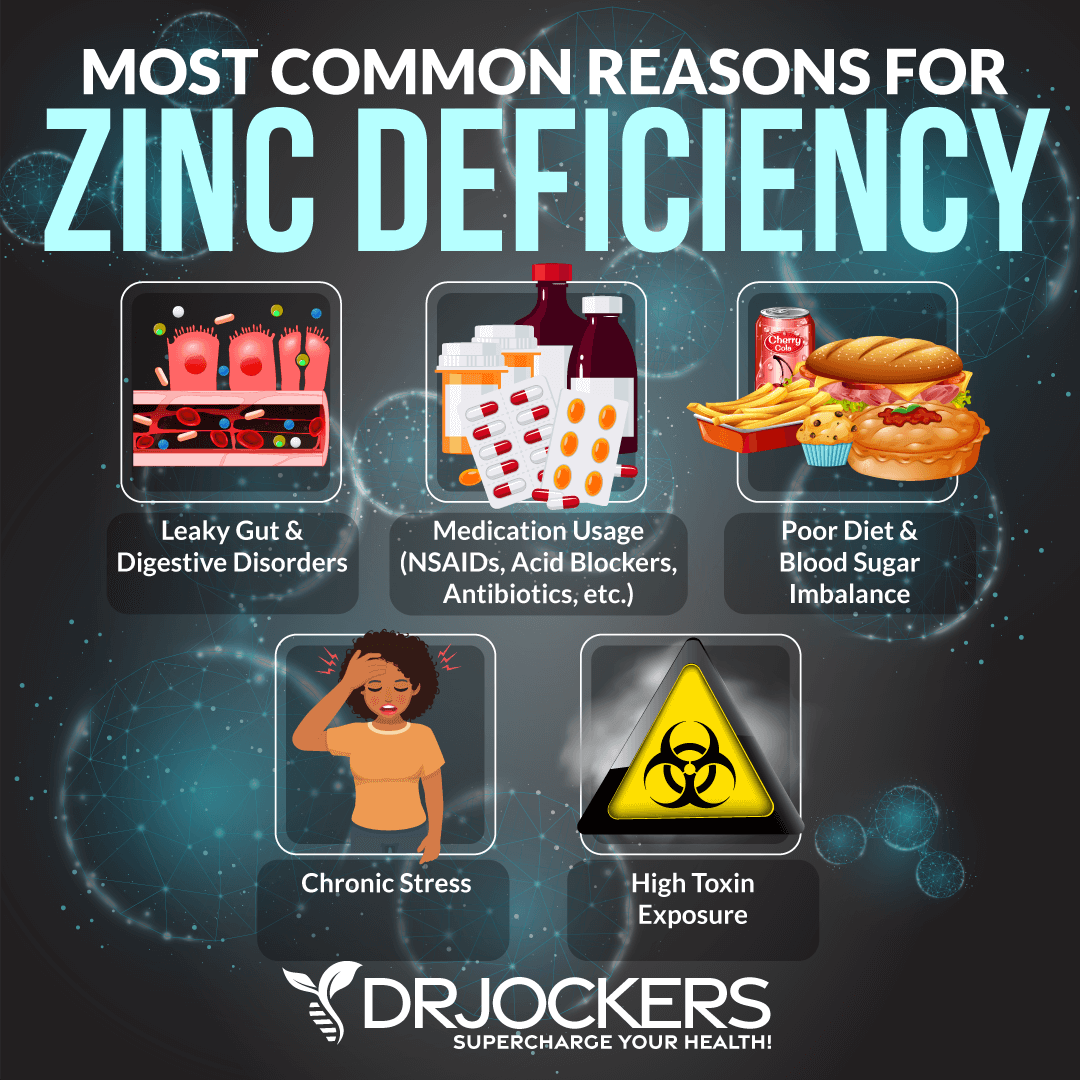
Limit Phytates in Your Diet
Phytates are compounds naturally found in plants such as whole grains and legumes, which bind to zinc and reduce its availability for absorption. Phytates, however, do not affect the absorption abilities of copper and are referred to as “anti-nutrients” (5, 8).
Vegetarian-based diets in particular often result in copper and zinc imbalances due to high amounts of phytates in their plant food sources and limited amounts of animal-based protein. The NIH recommends soaking beans and grains in water until they sprout to increase the availability of zinc for absorption (6).
Also a major source of phytates in the American diet today, processed cereal should be avoided if not limited to consumption in growing kids. Affecting 2 billion people today, cereal is partly to blame. (5, 6)
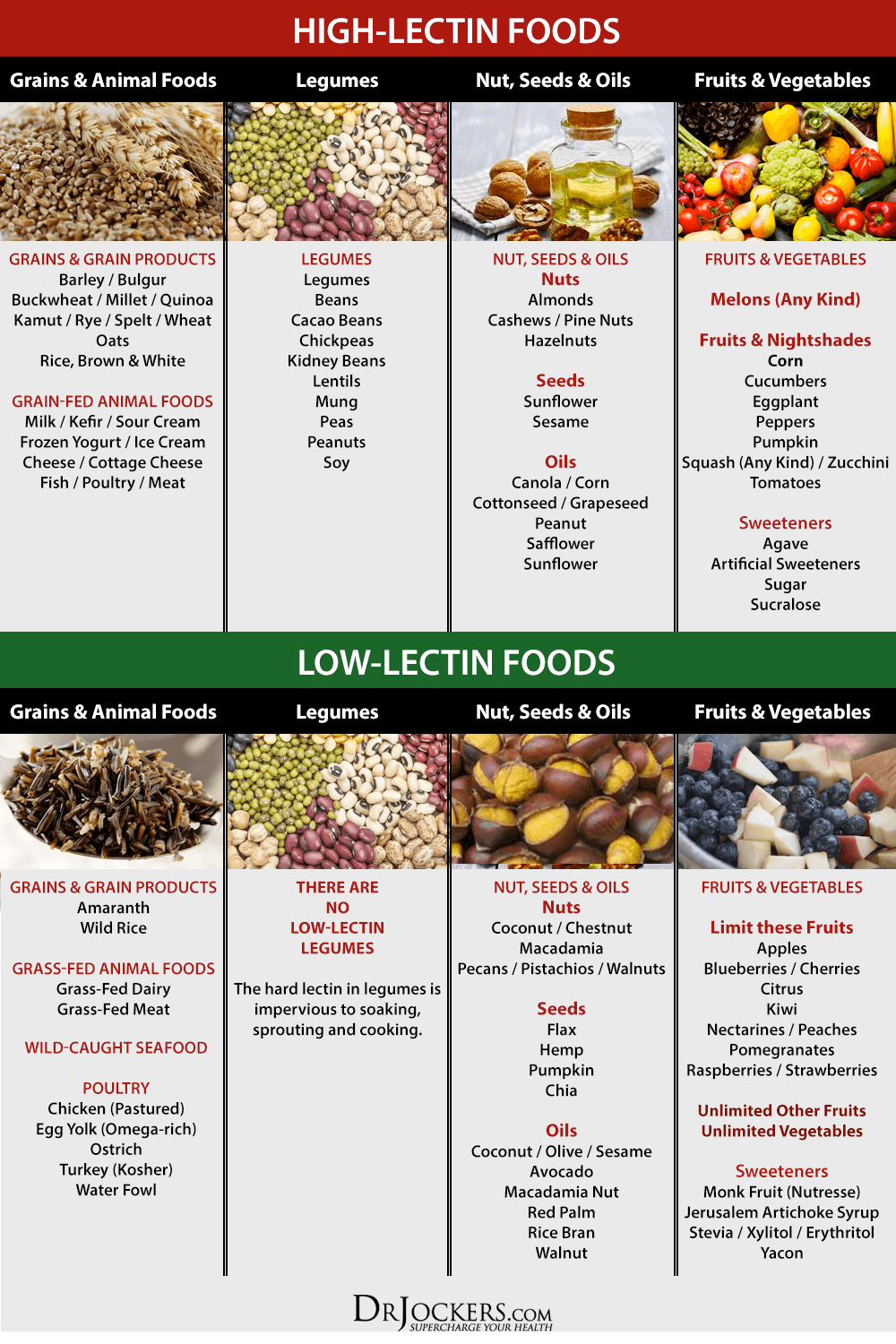
Consume High Quality Protein Sources
High quality pastured meats such as beef and poultry sources including eggs are excellent sources of zinc. Eggs provide an almost perfect ratio of zinc to copper containing 0.7 mg of zinc to only 0.1 mg of copper (8).
If you have been seeking an excuse to give them a try, oysters are actually the highest concentrated source of zinc you can consume in your diet (6). One oyster can provide you with your daily recommended zinc requirements.
Supporting your diet with whole fruit and vegetable sources can remove excess copper from the body and prevent damage caused by oxidative stress. Aside from zinc, manganese, iron, B vitamins, sulfur, and vitamin C all bind to copper and support the gradual detoxification of copper from tissue.
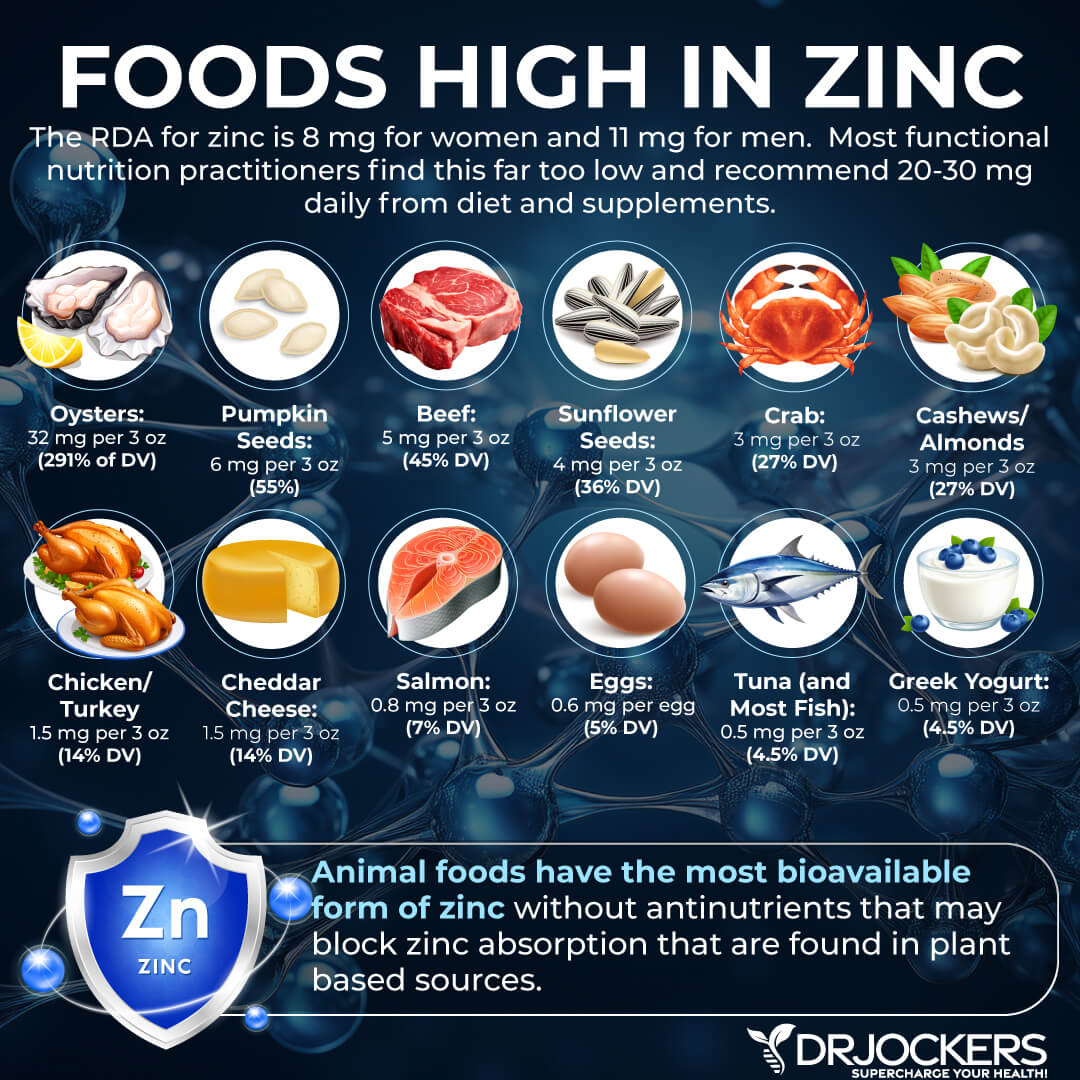
Proper Zinc Supplementation
Further supplementing your diet with a high quality form of zinc is required for health. (8) The recommended daily allowance for zinc is between eight to eleven milligrams for most adults. However, for functional health, most progressive nutritionists and doctors recommend between 30-40 mg/daily.
Zinc can be a problem when one supplements with more than 100 mg/daily, especially when it is done without additional copper. Zinc Glycinate—an Albion® TRAACS amino acid chelate—is a high-potency source of zinc formulated for enhanced absorption. In this form, zinc is coupled with two glycine molecules to facilitate its absorption across the intestinal wall and reduce interference from phytates and competing minerals (10).
Zinc Charge supports the immune system and proper enzymatic function by providing high potency zinc in 20mg doses.
How To Test
There are several ways to test your zinc levels. One that I am a fan of due to its simplicity and cost-effectiveness is the zinc sulfate taste test. All you do is purchase a bottle of zinc sulfate liquid (this is a good one), place a capful in your mouth, and observe the sensations in your mouth.
Below are the possible outcomes and indications:
You Notice No Metallic Taste: Zinc Deficiency
You Notice A Delayed Metallic Taste: Slight Zinc Deficiency
You Notice Slight Metallic Taste: Zinc Levels Are Adequate, But Could Be Higher
You Notice Very Strong Metallic Taste: You Likely Have Optimal Zinc Levels
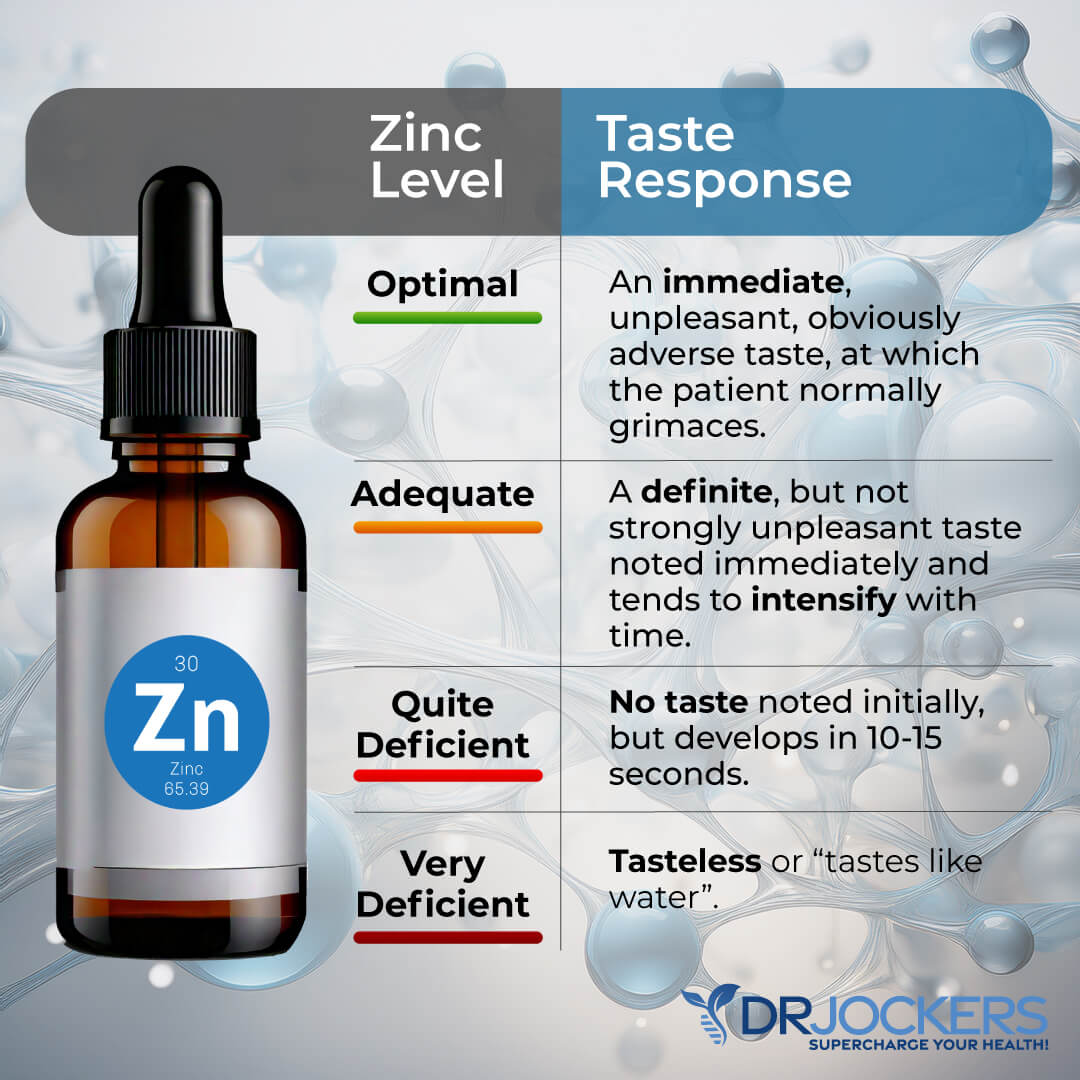
Blood Testing
Getting a thorough blood test on an annual or semi-annual basis is one of the best ways to pick up any underlying health challenges and prevent the development of degenerative disease. The lab markers found on a comprehensive blood analysis can catch potential health problems in their early stages and help one customize health strategies to prevent potential disease development.
One thing that my team of health coaches and I look at with all of our clients is a comparison between plasma zinc and serum copper. We want to see the zinc: copper ratio being between 1.0-1.3. This means that we should have a greater amount of plasma zinc in comparison to serum copper.
The comprehensive blood analysis looks at a number of inflammatory markers, blood sugar regulation markers, thyroid, liver, kidney, and immune health as well. You can find out more about the comprehensive blood analysis here
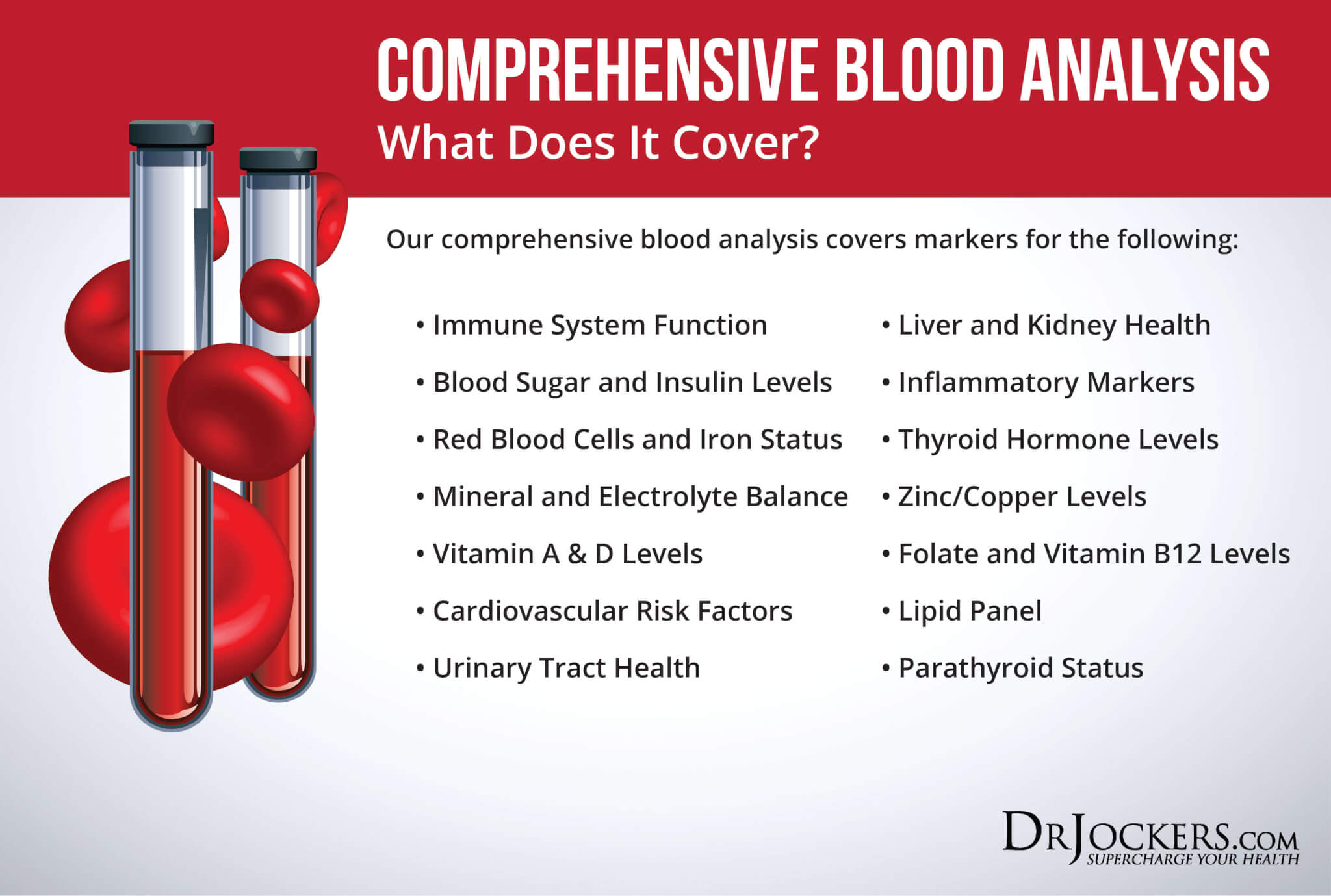
Consider Seeing a Functional Health Practitioner
Copper toxicity is a serious condition, but the severity of the symptoms can dramatically improve with a proper health plan. If you have tried everything and nothing seems to be working, consider finding a functional health practitioner to help you identify the root cause factors and implement a specialized plan to improve your health.
Finding the root cause factors behind the development of any major health condition is the key to figuring out the best natural nutritional and lifestyle solutions. Our team of health coaches has been trained by Dr Jockers and other advanced practitioners to sort out the root cause and design programs to help people improve their health. For more info on the DrJockers.com team of health coaches go here

Inflammation Crushing Ebundle
The Inflammation Crushing Ebundle is designed to help you improve your brain, liver, immune system and discover the healing strategies, foods and recipes to burn fat, reduce inflammation and Thrive in Life!
As a doctor of natural medicine, I have spent the past 20 years studying the best healing strategies and worked with hundreds of coaching clients, helping them overcome chronic health conditions and optimize their overall health.
In our Inflammation Crushing Ebundle, I have put together my very best strategies to reduce inflammation and optimize your healing potential. Take a look at what you will get inside these valuable guides below!
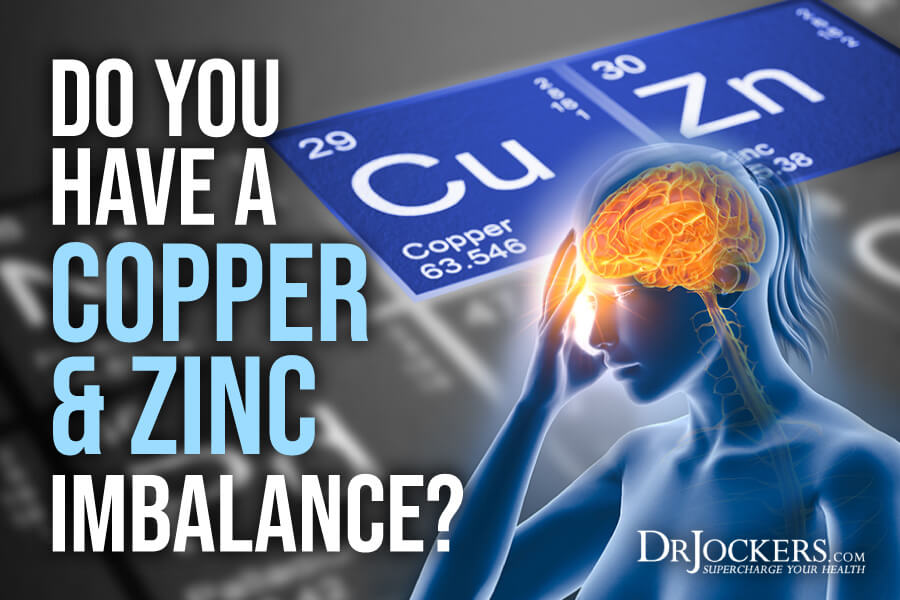

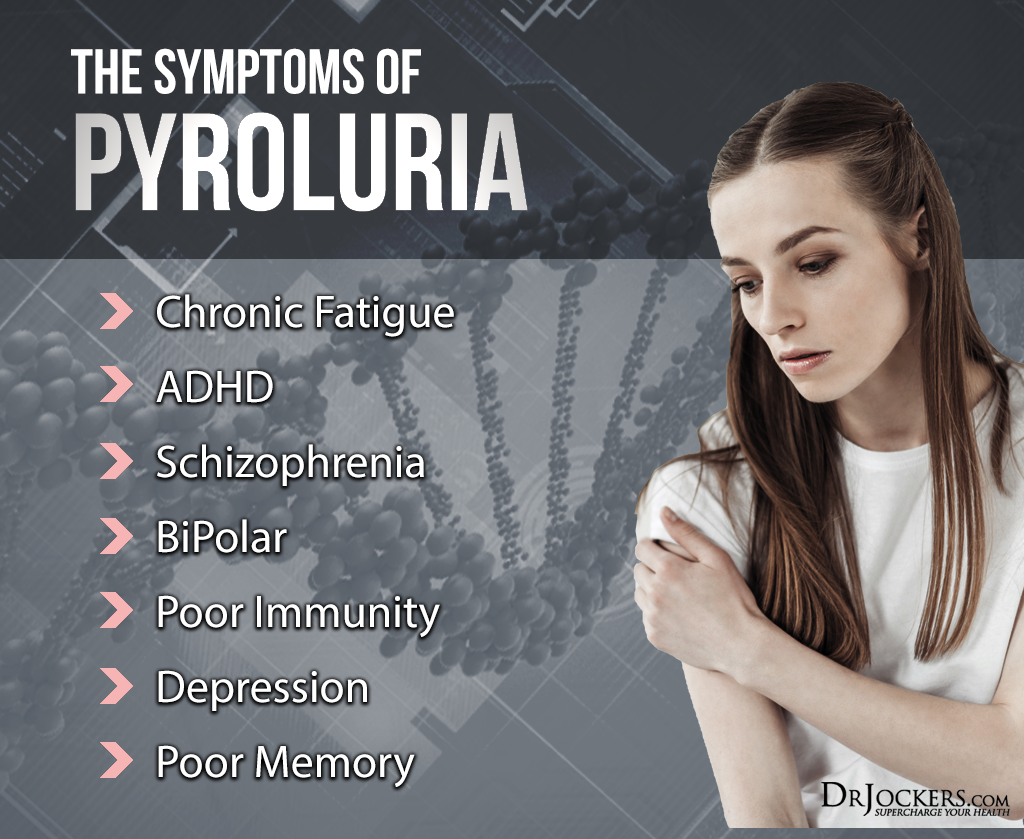
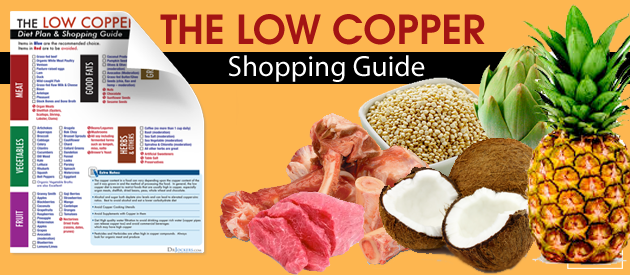





I looked at the shoppers guide and saw a different list on another site that put coocnut, avocado, and leafy greens as high copper to avoid. But in the shopper guide here, these are all on the good list. Is that because you are trying to encourage balance (hence moderation with avocados and not avoiding entirely?). Should I eat less leafy greens if copper is an issue?
Also, I have EHS, and a person who has been in “remission” from EHS for two years said to rebalance copper to zinc, saying those with EHS have higher copper. I had my blood tested a while ago, and it was low, and my zinc was somewhat low end of normal. This confused me as I anticipated it would be higher copper. Is it possible to have low copper in blood serum but have an overall condition that is high with copper in tissues? Thank you for any help!
Yes this is possible Deb! You may need to do a hair mineral analysis, which is a good way to test your copper=zinc ratios. I would suggest avoiding nuts and grains which are high in copper and low in zinc. Stick with coconut, avocados and leafy greens as well as wild-caught fish and grass-fed animal products for good zinc.
I have high zinc and in range copper. I hat bad headaches when I eat something higher in zinc stomach cramps also. What can I take to lower zinc?
Hey Thomas, if you are supplementing with Zinc , you may want to lower your dose or take it less often. You may also want to consume those higher Zinc foods on a more occasional basis.
Hi Dr. Jockers,
I started taking 8 mg of zinc picolinate at the beg of September. I gradually worked my way up to 15 mg. I am very sensitive to supplements. As I was taking it, I started having insomnia. It gradually worsened and intensified until I would be awake the entire night! I have been off the zinc picolinate for a month now. My sleep has improved to insomnia 1-2x a week and great sleep the other nights.
From what I read, this is most likely because zinc causes stored copper to be released?
What I don’t understand is the length of time it is taking to get back to normal with my sleep.
I have found if I eat high copper foods (like liver) now, that I will have insomnia that night.
I am avoiding high copper foods now.
What do you think of the zinc causing extreme insomnia? And what does that indicate about my copper levels?
Blood work has low normal zinc and copper. ION panel also has low normal zinc and copper.
Thank you!
Hey Heather, sorry to hear about this! You may want to try a Zinc Glycinate (like we carry), a low copper diet, and potentially magnesium l-threonate to improve glutamate-GABA conversion. Of course there is the chance that there are more underlying factors.
How can I lower zinc due to problems with poligrip?
Hey Cheryl, follow the strategies in this article: https://drjockers.com/8-proven-ways-to-improve-your-detoxification-system/ and consider supplementing with a zinc glycinate in the future.
Hi Dr. Jockers,
I have ZN/CU ratio is 18.57,
I have problem in fertility , I was taking fertility medicine which is rich with zinc
where I discovered recently that the copper is low in my body , I started taking copper
pills with 2 MG twice daily and stopped taking the fertility medicine
please advise if I shall keep taking the fertility medicine which is rich with zinc in addition to the copper or I shall keeping stopping it .
I have low zinc (68 (range 60-130)) and very high copper (219 (range 70-175)). I have read other places it is not a good idea to supplement zinc with a pill form of zinc as it is easy to raise too high and upset the Zn:Cu ratio. I have also read that I can supplement with a high quality, whole food Vit C to help raise zinc and lower copper. Is this a proper approach? Is supplementing with zinc in pill form not a good idea? FYI – hypothyroid (optimal on ndt and t3 meds), bcp for 7 years continuously, back injury resulting in 18 cortisone injections, unable to exercise. I was thinking those things may have led to my current zinc and copper levels?
Hey Chantal, I would suggest a low copper diet: https://drjockers.com/wp-content/uploads/2015/07/LowCopperDietPlan.pdf
As well as Zinc supplementation with 20mg per day: https://store.drjockers.com/products/zinc-charge
Hello Dr. Jockers,
I have recently had my serum Cu and Zn levels tested. My Cu is 91 ug/dL (normal range 72-166) and my Zn is 73 ug/dL (normal range 56-134). I am unsure what the proper ratio between the two should be. If the Copper to Zinc ratio should fall between 0.7-1.0 mine would be high being that it is 1.25. Looking at the serum levels individually they are both on the lower side of the scale. Do you have any suggestions on how I should address the imbalance at hand?
Yes, that is low for zinc. I would supplement with 20 mg (1 cap) daily of the zinc charge with your first meal each day. https://store.drjockers.com/products/zinc-charge
Dr. Jockers,
I tested Serum Cu and Zn for me and my spouse (both in late 50s) and the figures are Me: Cu – 50.4, Zn – 143.4, units in mu.gram/dL.
I am not on any supplementation but my Zn is higher than the range and my Cu is slightly below range. Please suggest course of action to restore imbalance.
My Spouse: Cu – 181.1 and Zn – 112.7. Her Cu is higher than range. She is on supplementation of one tab of Cenovis 50+ Multi Vitamins & Minerals which contains 15 mg of Zinc (as Oxide) and 1 mg of Copper (as Cupric Sulfate anhydrous). Would request your suggestion for the imbalance.
Also please let us know the healthy range of Cu-Zn ratio.
Hair analysis revealed zinc level of 200 and copper level of 8.3. Everything I read is about high copper levels. What does a LOW copper level mean? Zn/Cu ratio is 24.1.
Hey AJ, this is just a sign you are taking in a lot of zinc. This would not be a concern unless you are experiencing the following: nausea, vomiting, loss of appetite, stomach cramps, diarrhea, and headaches. In that case, you would maybe want to consider lowering your zinc intake!
I have flagged high levels of zinc from urine sample and all the symptoms of high zinc
I have zinc= 149 (range 125-155) and copper= 20.8 (range 11-28) and i suffer from acne and hair loss. Does my zinc/copper ratio causes these problems? and how to treate it? Thank you
That is not enough information to tell Abeer. It could be a number of things:
https://drjockers.com/10-things-acne-means-health/
https://drjockers.com/13-hair-problems-mean-regards-health/
I wonder whether the stick of butter used to illustrate grass-fed dairy as a zinc source may lead people to conclude that butter is a source of zinc. As far as I know, it isn’t.
I just had a panel test for zinc
Result 63 micrograms per/dl
This seems high the normal serum level is: . 66mcg to 1.10 mcg per /ml these normal serum levels are alot lower than my test result should I increase my copper or do some sort of chelation? To reduce my zinc levels?
I’m zinc defiecent I’ve been taking 50mg of zinc picolinate for a year but my zinc levels never went up what’s the reason shall i or can i take zinc and copper together or take them separately and how much copper do u take with 50mg of zinc picolinate?
Hey Omar, I like Zinc Glycinate and Copper bisglycinate in about a 12:1 ratio
I was lead to believe that zinc and copper should be taken at least 2 hrs apart because zinc depletes the copper if taken together and can lead to a copper deficiency.
Can this be explained please?
Hello Lynda – no these minerals are always found together in food and although they compete for binding they don’t deplete each other. Taking them together is perfectly fine.
Hi
I have bi polar disorder,any advice or information that ay be of benefit.Thanks.
So sorry to hear that Joseph. Here is a very helpful article for you: https://drjockers.com/mood-swings-emotional-support/
Also this one: https://drjockers.com/12-ways-boost-mood-naturally/
I read your article when I was looking for something to help my son who had developed a nervous tic. . As well as homeopathy and probiotics I added .zinc supplementation and it has been transformative . He is focused, happy and calm
Thank you
So great to hear this Helen! Praise God!!
Do you have an article regards to free/unbound copper? Increasing ceruloplasmin?
No we do not Marjore!
Yes Ceruloplasmin test is super interesting and uncovers hidden Copper issues as well as Iron.
Ceruloplasmin Transports Copper
Ceruloplasmin must have copper attached to it to function.
Its main role is to transport copper throughout the body.
Between 70 and 95% of the copper in the blood is bound to ceruloplasmin.
Free, unbound copper concentrations in the blood tend to increase when ceruloplasmin levels are LOW. Deficiencies in copper can cause low levels of blood ceruloplasmin because the protein is degraded more quickly when it is not bound to copper.
Helps Iron Mobilization
Ceruloplasmin helps move iron out from the tissue. In the brain and liver, ceruloplasmin promotes the movement of iron out of cells and onto transferrin, the main iron carrier in blood,
Low levels of ceruloplasmin can cause iron accumulation in the brain, liver, and pancreas. Deficiencies in dietary copper can lead to iron-related problems such as anemia, and it could possibly have to do with ceruloplasmin transporting iron. However, because mice bred without ceruloplasmin were not anemic, scientists think that copper helps iron utilization independently of ceruloplasmin.
Health Effects of Low Ceruloplasmin
Low ceruloplasmin may contribute to:
Iron accumulation/iron overload in tissues.
Parkinson’s disease and Alzheimer’s disease due to an increased iron concentration in the brain. Initial studies have found a link between lower ceruloplasmin, iron accumulation, and neurodegenerative disease, but further larger studies are needed to confirm this.
Check your copper levels. Low levels of ceruloplasmin are sometimes linked to low levels of copper. If your copper is low, you may need to increase it. In addition, if you’re taking zinc supplements, you may want to stop or decrease the dosage, since zinc can compete with copper for absorption.
In other cases, low ceruloplasmin is associated with copper overload (e.g. Wilson’s disease) . That’s why it’s important that you don’t start taking copper supplements before checking your levels and getting a green light from your doctor.
Thanks for sharing!
You are so correct T. I just experienced this. All these articles on copper toxicity and low zinc caused me to over take zinc and it drove my copper way down as confirmed on hair mineral test. It drove my iron ferritin levels way down even though I eat mostly meat. I have to take Heme iron with some copper biglycinate and whole food vitamin C to increase cerruloplasm too. Feeling much better now.
“Chronic anxiety is known to cause greater health concerns such as increased blood pressure, depression and lowered immunity.”
I think the statement above is slightly off target… it’s my understanding that health concerns such as increased blood pressure, anxiety, depression, and lowered immunity have a common cause, ie anxiety is just one more symptom of a health issue, not the cause.
Yes very true!
Hello,
Hashimoto’s with low copper and iron….getting hives as well.. any suggestions? Thank you so much!
Sorry to hear that! I would recommend reading this article: https://drjockers.com/suffering-histamine-intolerance/
Hi, Dr. Jockers,
I have been supplementing with 30 mg of Zinc Glycinate , Vit C 500 mg as well as Selinium ( selenomethionine 200 mcg) as part of my regimen for Hashimoto’s thyroiditis. I do not take copper supplements. However my Zinc levels ( 155.37 mg/ ml) , copper levels ( 172.2 mg/ ml) and Selinium levels ( more than 500 mg/ ml) all of these levels have come high, copper to Zinc ratio is 1.1. I am now confused whether to stop or reduce Zinc supplement. But I do not take copper supplements. I may be consuming water with high copper content which I will stop immediately. Please advise on how to proceed . Thanks in advance
Dr. Kavita
Yes you probably no longer need to supplement with zinc. Blessings to you!
Thanks a lot!
hi,
I have noticed that whenever i take copper 1mg at night i can sleep better. Otherwise i need to take Trazodone25mg for sleep. I also have premature grey/white hairs and lot of dandruf.
Zinc 25/50 mg does not help me for insomnia.
In your case, you may need more copper. This is rare but can happen! Blessings!
Thanks for reply
is it possible to be deficient both in Zinc and copper?
White coating on tongue does relate to copper or zinc?
That relates to candida overgrowth and possible zinc deficiency
Yes if you have malabsorption problems or are on a processed food diet.
Thanks for reply.
I have malabsorption problem. Kindly quide me.
Yes Adnan – here is a helpful article: https://drjockers.com/6-nutrients-heal-leaky-gut-syndrome/
I would also recommend taking our Mineral Support – 2 caps with each meal: https://store.drjockers.com/products/mineral-support
Copper deficiency is not that rare. Copper is found in veggies and liver and most Americans do not eat alot of those.
I recently got a copper IUD inserted after being on hormonal BC for 8 years. Recently I’ve had issues with rapid heart rate, increased anxiety, and difficulty concentrating. Your chart states that contraceptives deplete zinc…so I’m assuming after quitting those and getting the copper IUD right away I might be exhibiting signs of high copper levels and low zinc? Would a zinc supplement help alleviate this? Thanks so much.
Hi Sarah, I definitely recommend speaking with your physician about the symptoms you are experiencing and before adding new supplements to your diet. Working with a functional health practitioner can help navigate you on your health journey. This article can help: https://drjockers.com/functional-nutrition-tips-to-find-a-great-health-coach/
Hi,
My son has low copper and high zinc and shows signs of copper deficiency. Doesn’t respond to copper supplementation. Plus, when he eats high copper food – especially if he has SAM-e L methionine (for depression) he gets sick…like poisoned, itchy, migraine, and more depression… mystery! Copper deficient…but rosy doesn’t seem to want it :/
Hey Beverley, I’m so sorry to hear this. It is important to work with a properly trained physician to understand the root cause of your son’s depression and the root cause of the side effects he is experiencing with SAM-e. This article can help: https://drjockers.com/low-serotonin-levels/
Sorry to hear about this Beverly! You can have him eat higher copper foods like nuts!
I tested my zinc and copper in my blood. My copper was 123 and my zinc was 122. Ceruloplasmin was 27.8. I do not supplement copper or zinc. I do eat oysters maybe once a month on average at the most. I take some herbs like curcumin and a mushroom supplement. Are these levels too high? I was wondering about taking a pinch of zinc maybe 5 mg few days a week to improve zinc to copper ratio a tad
Hey Dawn, Curcumin and mushroom supplements can be very helpful.
I am trying to determine what my copper to zinc ratio is. My zinc is .82mcg and copper 1.79mcg. I think my free copper is too high. What say you? And what are optimal numbers for a 45 yo woman?
I am confused by those measurements. On our HM Analysis we use the ug/g and we want Zinc to be around 150-200 and Copper around 15-25.
I got my blood tested for copper and zinc among other things. I have a copper serum level of 117, ug/dl 72-166. And zinc, plasma or serum level 97, ug/dl 56-134. Would this imbalance cause slight dizziness, headaches, anxiety, etc? What should I use to balance this?
Hey John,
That isn’t a significant imbalance. For the dizziness, headaches and anxiety, I would look for possible mold issues, gut dysbiosis or a magnesium or B12 deficiency.
Thank you for your response. I didn’t test for magnesium, but B12 is a 487 pg/ml 232-1245. Low end of the spectrum, is that considered low?
Yes that is a low B12 level. You want to be up over 800. If you eat meat on a regular basis, this is showing that you are not absorbing B12 very well. That would most likely be due to a gut infection like H Pylori. I would try taking B12 Power – 1 cap daily for 2 months in the morning and see how you feel. https://store.drjockers.com/products/b12-power?_pos=1&_sid=5000a773e&_ss=r
I recently had a hair tissue mineral test. My zinc to copper results were 20.00. A normal ratio is 8.00/1. What should I do to bring balance to these mineral s?
Hey Jennifer, I would recommend taking the Bioactive carbon minerals which utilizes specific fulvic acid chelated minerals and works to balance ratios. It also helps to remove heavy metals. Take 20 drops – 2x daily for 4 months and retest. https://store.drjockers.com/products/bioactive-carbon-minerals?variant=28528634626096
Hi, I realized I have a histamine intolerance to foods that give me headaches and migraines. I am feeling better in between periods when avoiding too many foods high in histamine. But my period headaches /migraines are still very bad!!! When I was a teenager I remember getting a hair test and my copper was overloaded. My hair falls out a lot too. I tried hormonal balance pills and they don’t help. Any advice?
Sorry to hear that April! I would recommend following the strategies in this article: https://drjockers.com/8-strategies-relieve-pms-symptoms/
Thanks you for this information
I’am not from America and i have hight level of zinc and i don’t take any supplément if zinc. I have many problems chronic fatigue hair loss stress memry problem and thick tongue what can I do?
Sorry to hear about this! I would recommend this article: https://drjockers.com/chronic-fatigue/
Hi,
Thank you so much Doc!
I got tested for both Copper and Zinc and my results were as follows
Zinc in Serum / Plasma: 91.68 mcg/dL Ref.Range (60 – 130)
Copper in serum / Plasma: 93.24 mcg/dL Ref.Range (70 – 175)
Do you think my levels are where they should be? I just started supplementing with Zinc glycinate and Copper, not sure if I should keep supplementing or not.
Yes those are within range although I do like to see the zinc slightly higher than the copper such as a 1 – 1.2 ratio of zinc:copper, so it is good to do some supplementation.
I had the opposite. Super high zinc and copper deficiency. Everyone said to take zinc for covid. I was taking close to 60mg a day and avoiding copper because of articles like this. I started getting very fatigued months ago and it kept getting worse. I did a blood test that showed low ferritin levels which is iron in storage and the best test for iron status. Found out you need copper to absorb iron and cerruloplasm to move it so it doesn’t build up in your organs. Zinc also blocks copper absorption and iron absorption. In just days of taking copper glycinate (4mg), 20mg Heme iron and cutting zinc to 10mg, I feel better. Found a Hair Tissue Analysis I did back in August and t showed low copper and a Zn:Cu ratio of 15:1. Get tested before you mess with vitamins and minerals.
Forgot to mention that tests showed high B12 and Folate and midrange RBC Magnesium.
Hi Dr Jockers,
I have Rheumatoid Arthritis and also high Copper at 166.6 mcg/dl with Zinc at 114.2 mcg/dl. My doctor is trying to lower my Copper with Zinc Picolinate at 20 mg per day, however I am really sensitive to supplements and even at smaller doses of 7 mg of Zinc, it makes my Arthritis flare up, making one of my joints really swollen, stiff and painful.
How can I raise my Zinc and lower my Copper levels without flaring my Arthritis?